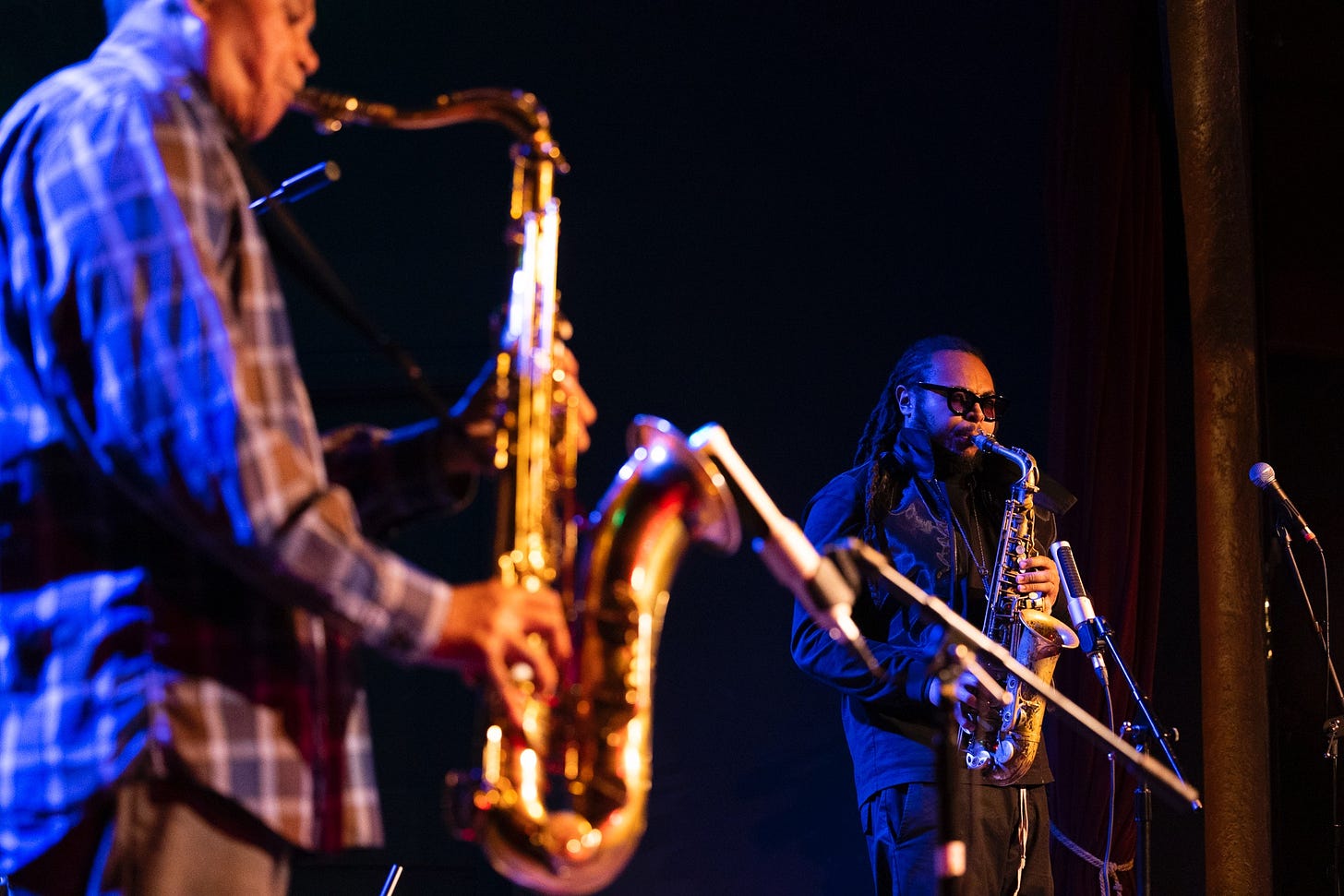Transmissions, Transitions
A few days into my new gig at WRTI, some thoughts about comings and goings

My first day on the job at WRTI, just a couple of days ago, began with a solemn task. The night before, I’d learned of the passing of Monnette Sudler, a guitarist, singer, composer and educator who embodied the best of the Philadelphia jazz scene. So as I walked into my new office on the campus of Temple University, Priority No. 1 was clear: I needed to report, write and publish Sudler’s obituary, and time was tight.
Before I had a chance to get started, Josh Jackson — WRTI’s associate general manager, a longtime ally in the jazz trenches, and now my boss — informed me that Michael Bourne had died. I absorbed this news as a physical sensation, bracing myself against the doorframe. Bourne was a legend in jazz journalism and broadcasting, and for more than 35 years he was a bard-in-residence at WBGO, where he mentored generations of jocks, Jackson included. For roughly the last five years, during my own tenure at WBGO, I’d had the privilege of observing Bourne up close, and editing his dispatches, which were as full of big personality as his rough-and-ready voice on the air.
If losing Bourne and Sudler signals the end of an era, I’m aware of a new era dawning as well. At WRTI, the jazz and classical station that I first started listening to as a college student in the mid-’90s, I’m joining a deep reserve of talent — and a team whose general manager, Bill Johnson, grasps the vital role public radio can fill within a creative community. Since relocating to the Philly area with my family around this time last year, I’ve witnessed that commitment both on the air and on the ground. In January, for starters, WRTI and Ars Nova Workshop co-presented a thrilling album-release show by the Immanuel Wilkins Quartet, which Jazz Night in America captured for video release at NPR.
Ars Nova Workshop, founded and run by my friend Mark Christman, also teamed up with WRTI for the launch of a narrative podcast called Dangerous Sounds, made with support from various Danish cultural entities. In late March, two generations of indomitable Philly saxophonists — Wilkins, in his mid-20s, and Odean Pope, now in his early 80s — unfurled an explosive free-improvised performance with Danish drummer Kresten Osgood, the podcast’s charmingly inquisitive host and researcher. Getting behind a project like this is a sign of deep, honest conviction, and I’m here for it.
My second day on the job at WRTI, just yesterday, involved a bit more breathing room. No longer on an urgent morning deadline, I began to settle into my office. A succession of folks dropped by to extend their welcome: new classical colleagues like programming director Zev Kane and host Melinda Whiting, and old acquaintances like J. Michael Harrison.
This also happens to be the first week that my friend and former WBGO colleague Greg Bryant is on the air at WRTI, as the new host of Evening Jazz. A prime-time weekday show, the longtime home of beloved announcer Bob Perkins, Evening Jazz is a terrific showcase for Greg’s catholic taste — something he and I often bonded over during our two seasons as cohosts of the podcast Jazz United.
So another thing I did on Day 2 was congratulate Greg on his first shift, which sounded great: an intuitively hip mix of classic and contemporary, heart and soul. Then I told Greg about some activity in the building: the aforementioned Pope and Wilkins were workshopping a new project in the performance studio, with collaborators including trombonist Kalia Vandever and drummer Nazir Ebo. (Once again, this is a byproduct of WRTI / ANW synergies.) Greg and I popped into the control room and listened for a while, just digging. So much fresh possibility, so much positive energy.
The glow lasted a while, until I got word of another passing: Creed Taylor, the pioneering producer who helped define the sound of jazz and popular music, through his own CTI Records and on landmarks like Getz/Gilberto and Bill Evans’ Conversations with Myself. I made some inquiries and an assignment, enlisting the estimable James Gavin, whose obituary should soon be up at NPR Music.
Then, just as I was preparing to head home for the day, a devastating blow: jaimie branch, the incredible trumpeter, vocalist, bandleader and composer, had died at her home in Brooklyn. She was 39, already a force to be reckoned with — but also still evolving, still finding ways to knock us back in our seats (or on our feet). I last saw jaimie in March at the Big Ears Festival, where FLY or DIE was ferocious as ever. Offstage she was her usual boisterous self, cracking jokes and giving hugs.
I stayed up to write an NPR Music obituary, extending Day 2 into the wee hours. This has been a rough couple of days, in terms of souls that have transitioned, losses sustained. But I also feel fortunate and inspired, excited to be starting a new chapter while I build on what I’ve learned so far. “WRTI's mission is to champion music as a vital cultural resource,” reads the organization’s mission statement, in full. It’s what I strive for — what I’ve tried to do, in my listening and writing, since I started out here in Philadelphia some 25 years ago.
My third day on the job is just coming to a close. I spent a good chunk of it making rather ambitious plans, which you’ll hear about soon. So, watch this space. Keep an eye on wrti.org while you’re at it.


